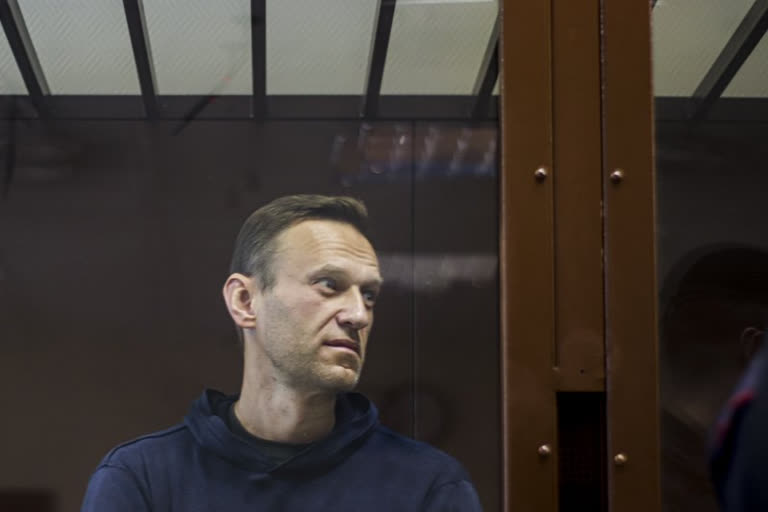Moscow: Russian police conducted a late-night search of the headquarters for jailed opposition leader Alexei Navalny, whose arrest last month set off nationwide protests.
The search by a dozen police ended at about 1 a.m. It was not immediately clear if the police took away items as potential evidence, but photos posted by Navalny’s staff on social media showed them bagging material including a coffee mug.
There was no statement from police about the reason for the search; the Mediazona news website that focuses on political repressions and human rights abuses cited a Navalny staff member as saying that police said they had received a report that pornography was being published at the office.
Navalny was arrested on Jan. 17 when he returned to Russia from Germany, where he had spent five months recovering from nerve-agent poisoning that he blames on the Kremlin.
He later was ordered to serve 2 1/2 years in prison because his time in Germany violated a suspended sentence he was handed in a money-laundering and fraud conviction.
The arrest sparked protests throughout the county on two weekends in January, in which a total of about 10,000 people reportedly were arrested.
Read:| Moscow court orders Kremlin foe Navalny to prison
Meanwhile, a Moscow court on Wednesday ordered the arrest of a top ally of Russian opposition leader Alexei Navalny, but Lithuania, where the associate lives, bluntly rejected the demand to take him into custody.
The action against Leonid Volkov by the Basmanny District Court was seen as part of an effort by authorities to squelch demonstrations demanding the release of Navalny, a top Kremlin foe who has been jailed since Jan. 17.
Volkov, a chief strategist for Navalny, was charged with encouraging minors to take part in unauthorized rallies, which could land him in jail for up to three years. He had already been put on an international wanted list.
Volkov, who has lived abroad since 2019, has rejected the charges, and Lithuania’s government has refused to carry out the Russian court’s order.
“Using international tools for politically motivated prosecution is a wrong practice,“ Lithuanian Interior minister Agne Bilotaite said.
“This raises serious doubts about Russia‘s membership in these organizations,“ she said, referring to the Russian arrest warrant sent through Interpol.
Protests across Russia drew tens of thousands of people to the streets for two straight weekends in January in the largest show of discontent in years. More protests rocked Moscow and St. Petersburg after a Moscow court on Feb. 2 sentenced Navalny to two years and eight months in prison for violating terms of his probation while recuperating in Germany.
That stems from a 2014 embezzlement conviction that Navalny has rejected as fabricated and the European Court of Human Rights has ruled to be unlawful. He described his new imprisonment as “Putin’s revenge” for surviving and exposing the assassination plot.
Read:| Navalny in court over 'defaming' WWII veteran
The authorities responded to protests with a sweeping crackdown, detaining about 11,000 people across Russia, many of whom were later fined or handed jail sentences ranging from 7 to 15 days. They also have moved to isolate key members of Navalny’s team, putting several of his top associates under house arrests for two months without access to the internet.
In a shift of strategy amid the crackdown, Volkov said last week that the pro-Navalny demonstrations should pause until the spring, arguing that any attempt to maintain rallies each weekend would only lead to thousands of more arrests and wear out participants.
On Tuesday, however, he announced a new form of protest, urging residents of big cities to briefly gather in residential courtyards on Sunday with their cellphone flashlights turned on. He argued that the new tactics — similar to ones used by anti-government protesters in neighbouring Belarus — would prevent Russian riot police from interfering and allow more people to participate without fearing repressions. The Belarus protests follow the reelection in August of the country’s longtime autocratic President Alexander Lukashenko in balloting widely seen as rigged.
Navalny’s arrest and the crackdown on protests have further stoked tensions between Russia and the West. The United States and the European Union have urged Russia to release Navalny, but the Kremlin has accused them of meddling in Russia’s internal affairs and warned that it won’t listen to Western criticism of Navalny’s sentencing and police actions against his supporters.
(with inputs from agency)



